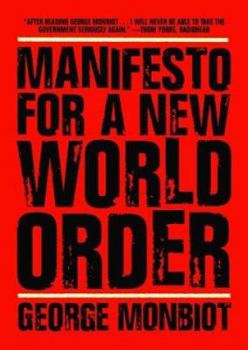Manifesto for a New World Order
Select Format
Select Condition 
Book Overview
Naomi Klein's 'No Logo' told us what was wrong. Now, George Monbiot shows us how to put it right. Provocative, brave and beautifully argued, 'The Age of Consent' is nothing less than a manifesto for a... This description may be from another edition of this product.
Format:Hardcover
Language:English
ISBN:1565849086
ISBN13:9781565849082
Release Date:April 2004
Publisher:New Press
Length:224 Pages
Weight:0.95 lbs.
Dimensions:1.0" x 5.6" x 7.6"
Customer Reviews
3 ratings
What are you waiting for?
Published by Thriftbooks.com User , 15 years ago
April 2004 - When a group organised a program opposite the World Social Forum with the protest that the WSF was "not radical enough" I asked, why aren't you painting the walls of Reliance Industries? Are they radical enough? I am as wary of cheap sneers and easy dismissals as I am wary of anything calling itself a "manifesto for a new world order." The fact is, it's not so easy to dismiss the prevailing world order. So, in considering George Monbiot's latest book, we must first grudgingly look beyond the bold capitals on the cover declaring "For Sale in the Indian Subcontinent Only," not unlike so many dams, discontinued contraceptives, unapproved pharmaceuticals & pesticides. In this case the intention is to protect the profits of the publisher in other markets. Overlooking that as well, we can appreciate the effort involved in proposing a constructive program amidst a familiar cacophony of dissent. Monbiot's Age of Consent appeals to those from all stripes of the Global Justice Movement seeking common goals, namely to "replace the system which works for the powerful with one which works for the weak ... to replace a world order built on coercion with one which emerges from below, built upon democracy" (p.67-68). He evaluates the existing systems such as the United Nations, which have also been founded with such noble intentions and calls for the UN General Assembly to be democratized, capturing the powers now vested in the Security Council. Along with this he proposes a democratically elected World Parliament, and International Clearing Union for timely debt clearances and a Fair Trade Organisation. Details of these proposals draw from historical experiences and ideas which have been put forward in other times and places, which Monbiot believes deserve a chance to succeed here and now. To popularise and reach consensus on this program Monbiot proposes to "publish pamphlets and web pages ...in as many languages as we possess." (pg. 89) The trouble is, it's precisely those people who are most oppressed whose languages and communication technologies, knowledge paradigms are not represented in writing or in websites. A system that excluded these people would give disproportionate weight to the already powerful. While he understands that it will require extra efforts "to reach people who are illiterate," (p. 126) is he aware that the illiterate may be trying to reach us? What efforts could we make to be better reached? Sadly, he can't envision a scenario in which all have an equal voice or even an equal opportunity for a voice. Monbiot acknowledges, "We may have to start without some regions of the world." (p. 93) Missing from this manifesto is an appreciation for those who practice the solutions RIGHT NOW - without any big budgets or World Parliaments. An immediate benefit of a manifesto that demands, as Monbiot's does, to be taken seriously, due to the fine blend of passion and humility with which he argues for it, is that it generates deb
Solutions to the problems of globalisation
Published by Thriftbooks.com User , 15 years ago
I support the review given by the other reviewer (Alednam) to date (1 June 2009). I can also recommend a solution to the problems of globalisation: The International Simultaneous Policy Organisation is able to provide the means for control of the excesses of international capitalism and private banking.
Idealistic Book with Good Ideas
Published by Thriftbooks.com User , 19 years ago
This book is about a fairer deal for the poor countries of the world. It espouses the idea of a World Parliament and an International Clearing Union. The former is aimed at making the nations of the world accountable for their actions and the latter at redressing what the author sees as the economic anomalies of the world, whereby rich nations reap an undue benefit from the poorer worlds' resources. The author quotes his sources extensively but I feel that he could have drlled down deeper in many instances where another author is his source. Nevertheless, there are many disturbing facts in this book which should make readers aware of problems that they may not have previously considered. His analysis of the effect (and the effectiveness) of the IMF and the World Bank is very interesting and well worth reading. A major weakness of this book is the author's failure to address the effect of incentives on human behaviour. To a degree he does cover incentives for nations to behave in a manner which benefits the world and I believe that this also will contribute significantly to the debate. However, many of the great breakthroughs and inventions of the world, which have had a huge impact on living standards and longevity, have resulted due to the financial rewards flowing from such discoveries. George Monbiot is to be congratulated for having the gumption to challenge current assumptions about democracy and economies and to put forward ideas that might help to make the world fairer and safer. I recommend his book highly to persons interested in achieving those goals.






